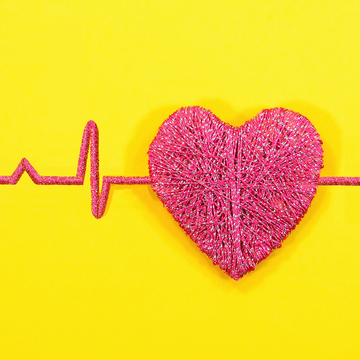Keep a consistent sleep schedule.
 Shih Wei Wang / EyeEm//Getty Images
Shih Wei Wang / EyeEm//Getty ImagesThe key to becoming a morning person is going to bed and waking up at relatively the same time every day — even weekends. "This will help our brain understand when to go to sleep and wake up," Dr. Bollu says. "By doing this, we are letting our internal or circadian clock run during specific hours during the daytime and letting it be inactive during the nighttime." Try gradually moving your schedule back 15 or so minutes at a time to help your body to adjust.
Skip caffeine after 4 p.m.
 AnaBGD//Getty Images
AnaBGD//Getty ImagesCoffee and other stimulants like tea and chocolate can mess with this internal clock when you have them later in the day. Opting for decaf at least 5 hours before bedtime will make following the same schedule easier instead of tossing and turning at night. Stick to about 300-400 mg caffeine (about three 8-ounce cups of coffee) daily if you're having trouble sleeping, says Jaclyn London, MS, RD, CDN, Nutrition Director at the Good Housekeeping Institute.
Advertisement - Continue Reading Below
Snack on pistachios and cherries.
 R_ka Csulak / EyeEm//Getty Images
R_ka Csulak / EyeEm//Getty ImagesReally! These foods have a rep for inducing sleep thanks to nutrients like vitamin B6 and magnesium. They contribute to melatonin production, the hormone that regulates sleep, London says.
RELATED: 17 Sneaky Foods That Make You Sleepy
But don't eat dinner too late.
 Line Klein//Getty Images
Line Klein//Getty ImagesSnacking less than an hour before bed can keep you up at night, too. "Your stomach produces acid to start digestion, which means if you're lying down you're more likely to get reflux," London says. The worst reflux-inducing culprits to avoid: anything breaded or deep-fried, processed meat, fast food, and rich desserts.
Advertisement - Continue Reading Below
Set a digital curfew.
 JGI/Jamie Grill//Getty Images
JGI/Jamie Grill//Getty ImagesExposure to bright lights and screens (like a laptop or cellphone) before bed can also throw off your circadian rhythm and compromise sleep quality. Enact a "digital curfew" that signals when it's time to put down your phone and click out of Netflix — the earlier, the better, says the National Sleep Foundation.
Limit the booze.
 Photo_Concepts//Getty Images
Photo_Concepts//Getty ImagesIt's true a glass of red wine may make your eyelids feel heavy, but you certainly won't feel more refreshed when you wake up. "Alcohol disrupts the sleep significantly, resulting in a state of sleep fragmentation and deprivation," Dr. Bollu says.
Advertisement - Continue Reading Below
Lay out everything the night before.
 KatarzynaBialasiewicz//Getty Images
KatarzynaBialasiewicz//Getty ImagesMake your morning stress-free by gathering up everything you'll need ahead of time. Check the weather for tomorrow, pick out your clothes, and pack your lunch and anything else you'll need. You'll get to sleep in a little later, and you're less likely to run the risk of forgetting something.
Wild Friends Oats and Nut Butter Prep breakfast too.
Credit: amazon
Advertisement - Continue Reading Below
And your coffee.
 Sofia Bagdasarian / EyeEm//Getty Images
Sofia Bagdasarian / EyeEm//Getty ImagesSame goes for your morning beverage. Program the coffee maker in the p.m. and the thought of a hot, ready-made cup can entice you out from other covers. Or brew a pot and stick it in the fridge for the iced version.
WITTI BEDDI Glow Intelligent Alarm Clock Wake up to more light.
Credit: amazon
Ever heard of sun salutations? "Getting a good light exposure (preferably natural sunlight) after waking up enhances our internal circadian clock and improves alertness," Dr. Bollu says. If you've pushed back the curtains and your room is still dark when you wake up, try a sunrise alarm clock. The Good Housekeeping Institute likes BEDDI Glow Intelligent Alarm Clock.
Advertisement - Continue Reading Below
Don't linger in bed.
 KatarzynaBialasiewicz//Getty Images
KatarzynaBialasiewicz//Getty ImagesThat means no hitting snooze, checking email, or whatever else you're tempted to do to squeeze in extra minutes under the covers. "The bed should be used only for sleep and not for work," Dr. Bollu says. "This subconsciously tells the brain that it should be doing nothing else but sleep when the body is in the bed." If popping out of bed feels impossible, reevaluate your bedtime. "When you meet your biological sleep requirement, you will automatically wake up feeling refreshed," he adds.
Find your motivation.
 RuslanDashinsky//Getty Images
RuslanDashinsky//Getty ImagesWithout an a.m. shift at work or quick-to-rise kids, maintaining a consistent sleep schedule can get tough. To borrow a phrase from Marie Kondo, find a way to spark joy in your routine. Sign up for a new workout class, walk the dog in a favorite peaceful spot — maybe shopping in an empty grocery store makes your least-favorite errand less stress-inducing. Whatever it is, take advantage of what the morning has to offer and early won't feel so early any more.
Advertisement - Continue Reading Below
Readers Also Read
Advertisement - Continue Reading Below
Advertisement - Continue Reading Below

























